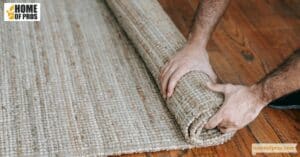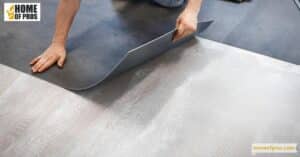The impact of flooring on indoor air quality is significant. Certain flooring materials, such as carpets, can harbor allergens, dust, and volatile organic compounds (VOCs), leading to poor air quality. Choosing low-emission and easy-to-clean flooring options can help improve indoor air quality, promoting a healthier environment.
In this blog, we will explore the role of flooring in indoor air quality and highlight the importance of choosing the right flooring materials for a healthy and safe indoor environment. Get ready to discover the impact of flooring on your indoor air quality and how you can make informed decisions when it comes to choosing the right flooring for your space.

Indoor Air Quality and Why It Matters
Indoor air quality is an essential aspect of maintaining a healthy and safe environment. Poor indoor air quality can lead to numerous health problems, including irritation of the eyes, nose, and throat, headaches, dizziness, and fatigue. This issue is particularly important as people spend increasingly more time indoors, especially during extreme weather conditions, such as heatwaves or cold snaps.
Moreover, the presence of volatile organic compounds (VOCs) can have long-term effects on health and can even cause cancer. So, it’s crucial to take proactive steps to improve indoor air quality, such as using air purifiers, avoiding smoking indoors, and regularly changing HVAC system filters. Maintaining high indoor air quality can improve overall health and well-being, making it a top priority in today’s world.

Types of Flooring and Their Effects on Air Quality
When it comes to choosing a type of flooring, many factors come into play. Factors such as cost, durability, and aesthetics are usually at the forefront of our minds. However, the impact of our flooring choice on indoor air quality is often overlooked. The type of flooring we choose has a significant effect on the air we breathe indoors. From carpet to hardwood to tile, each type of flooring has its own set of characteristics, some of which can have negative effects on air quality.
Carpet
When it comes to flooring options for your home or office, there are various choices available, including hardwood, tile, vinyl, and carpet. While each type has its own benefits, it’s essential to consider how they can affect air quality in the space. Carpet, in particular, can have some positive and negative effects on air quality. On the positive side, carpets can trap allergens and dust, ensuring that they don’t circulate in the air.
However, if not cleaned correctly, the carpet can also accumulate harmful bacteria and irritants, which can lead to respiratory issues. Therefore, it’s crucial to choose a high-quality carpet and implement routine cleaning schedules and proper ventilation to ensure a healthy indoor environment.

Vinyl/Linoleum
Vinyl and linoleum flooring have both been popular choices for many years, due to their durability and affordability. However, the type of flooring you choose can also have an impact on the air quality in your home. Vinyl flooring is made from petroleum-based materials and can emit volatile organic compounds (VOCs) that can be harmful to your health. On the other hand, linoleum flooring is made from natural materials such as cork and linseed oil, and does not emit harmful chemicals. It is also anti-static and naturally discourages the growth of bacteria and microorganisms.

Hardwood and Laminate Floors
Hardwood and laminate are two popular choices among homeowners. Not only do they add an elegant touch to any space, they are also relatively easy to clean and maintain. However, did you know that the type of flooring you choose can affect the indoor air quality of your home? Hardwood floors are a great option because they don’t trap dust and other allergens as carpet does. On the other hand, laminate floors often contain synthetic materials like formaldehyde, which can emit harmful gases into the air. It’s important to consider the impact of flooring on air quality when selecting a new floor.

Ceramic Tile
Ceramic tile is a popular flooring option that can provide an elegant and durable surface for any room. With its non-porous surface, ceramic tile is easy to clean and can resist water and stains. Additionally, ceramic tile does not release VOCs (Volatile Organic Compounds), which can negatively affect the air quality in your home. This makes it a great choice for people who suffer from allergies or respiratory problems.
However, it is important to keep in mind that the installation process of ceramic tile may involve the use of adhesives and other chemicals that could potentially affect indoor air quality.

Maintaining Quality Air with Flooring
Maintaining quality air is a crucial aspect of ensuring a healthy and comfortable living environment. One of the key factors that can affect air quality is the type of flooring in a particular space. It is essential to choose flooring options that do not emit harmful chemicals or pollutants into the air. This is where eco-friendly floorings come into play. Eco-friendly flooring options are made from sustainable materials and are designed to reduce air pollution. They trap allergens and dust particles to prevent them from becoming airborne, thus improving the overall air quality.
Regular Vacuuming and Cleaning
One of the most effective ways of achieving this is through regular vacuuming and cleaning of flooring. Dust, allergens, and other harmful particles tend to accumulate in carpets, tiles, and hardwood floors, causing respiratory issues, allergic reactions, and other health problems. Regular vacuuming and cleaning help to remove these particles, ensuring a clean and safe environment.
It is essential to use the right vacuum cleaner attachments and cleaning agents to ensure optimal removal of dirt and debris. With proper maintenance, flooring can be a powerful weapon in the fight against poor air quality, supporting the health and well-being of everyone in an indoor environment.

Proper Installation of Flooring
Proper installation of flooring can maintain quality air in your home or workplace. Flooring not installed correctly can cause various issues such as the buildup of mold, bacteria, and other allergens. It is important to ensure that the flooring is properly installed to prevent these problems. The installation process should be done by professionals who have experience in the field.
They can assess and provide the necessary solution to avoid moisture buildup, which is the primary cause of mold and bacterial accumulation. In addition, proper installation can also improve indoor air quality, leading to better health and well-being.

In Conclusion
In today’s world, indoor air quality is a growing concern. Many factors can contribute to the negative impact on air quality inside our homes, including the type of flooring used. As we spend most of our time indoors, it’s crucial to understand the impact flooring can have on indoor air quality. Various types of flooring materials emit different types of volatile organic compounds (VOCs) that can affect the air we breathe.
Choosing flooring options that emit low levels of VOCs, such as cork or bamboo, can positively impact indoor air quality. Making informed choices about the materials we use in our homes is critical to ensure a healthy living environment for everyone.












